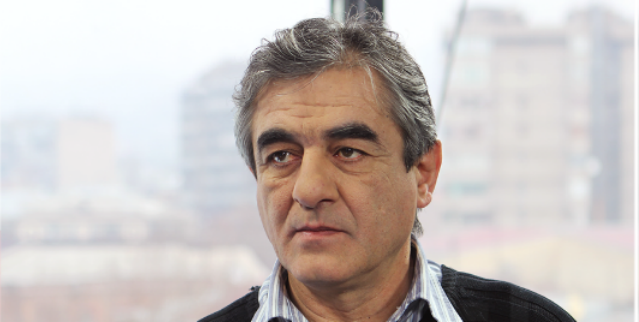While the Russian political leadership marked the settlement of the Nagorno-Karabakh conflict between Armenia and Azerbaijan as one of the priorities in its foreign policy concept, there are new conceptual proposals to strengthen the bargaining position of Yerevan developing in the Armenian expert community, which are capable to irrevocably fix the status quo, which suits the Armenian side.
Vestnik Kavkaza has already informed about a curious analytical computation of the known political scientist Richard Kirakosyan ("Armenia has sent a 'restraining signal' to Russia"), according to which, Iskander missile systems demonstrated at the military parade in honor of the anniversary of Armenia's independence were a restraining signal to...Moscow. After such a filigree Yerevan's move, which apparently herded Kremlin to a stalemate position - in fact, the Iskander deterrent de facto paralyzed Russia's leverage over the region - Armenia got an opportunity to break through at the 'second front': it will try to block unfriendly steps of Belarus and Kazakhstan.

In this regard, the director of the Armenian Center for National and International Studies, a political scientist Manvel Sargsyan suggested in an interview to 1in.am a simple and ingenious at the same time formula of strengthening "discipline" in the ranks of the EEU and the CSTO ("Armenia should not be silent, but force Lukashenko to think a hundred times before he takes the medal from Aliyev's hands"). Recalling that the member states of these organizations did not support Armenia demonstratively during the April clashes with Azerbaijan, Sargsyan proposed to exclude Belarus and Kazakhstan from their ranks. If we assume that Armenia will achieve withdrawal of these two states from the CSTO and the EEU, it will have a very win-win situation: only Armenia and Russia will remain in the EEU, the latter, as we suggested above, is already held by Yerevan in the grip of "a restraining signal" via Russian Iskander missile systems. As for the CSTO, than Kyrgyzstan and Tajikistan, looking to the fate of Belarus and Kazakhstan, will obviously make the necessary conclusions for themselves and express their unequivocal position on Nagorno-Karabakh, which coincides with the objectives of the Armenian diplomacy.
In such circumstances, the situation is clearly becoming uncomfortable for Baku, Astana and Minsk. We cannot exclude that the Kazakh president Nursultan Nazarbaev, realizing the threat of exclusion from the CSTO to his country, deliberately did not attend the last summit in Yerevan. It is likely that Alexander Lukashenko's hasty visit to Baku is linked to the need to discuss the further strategy of Belarus in the context of the threat of its exclusion from the EEU and the CSTO.






